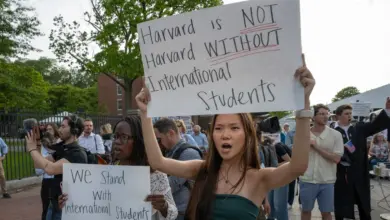The Coalition of University Professors announced today that they will continue their plan to boycott the coming academic year, in light of recent comments by the current Higher Education Minister, Motaz Khorshed.
Khorshed said yesterday at a panel discussion at Ain Shams University that the university heads will only be removed according to legal due process and will not be forced to leave. The statement comes after weeks of speculation as whether or not the Higher Education Ministry would, in fact, implement a cabinet decree to release the majority of university heads.
“Faculty members are shocked by the minister for higher education’s statements … and consider his statements a continuing effort to circumvent the dismissals, which is a revolutionary demand and a right of Egyptian universities that seek independence,” read a statement by the coalition released Friday afternoon.
Many high-ranking university officials have accepted the cabinet decree and stepped down, while others have reportedly refused to do the same.
“The ones who did not step down are exactly the same ones making exorbitant salaries,” said Khaled Samir, a spokesman for the coalition, which represents such prominent activist faculty groups such as the 9 March Movement for the Independence of Universities (Cairo University), the Ain Shams University Independence Movement, as well as University Professors for Reform, thought include members of the Muslim Brotherhood.
The coalition’s main reasons for the immediate dismissal of many of these leaders is that they were appointed by the government and given more of a security function – to control student life for the preservation of the ruling system – rather than an academic one.
The dean of Ain Shams University, Magd al-Deeb, claimed earlier to have not received the cabinet’s decree and thus refused to resign or force anyone else to. These statements lead to a 31 July demonstration in front of his office at the university.
According to Samir, the coalition is planning to boycott the coming semester along with numerous student groups, and with the support of the 25 January Revolution Youth Coalition.
"A large portion of activist student groups are supporting the boycott. The majority of the actual student union are against it because it is the same student union that was around before the revolution when State Security chose student union members," said Mohamed Lasheen, a law student and activist in Ain Shams University, one of Cairo's largest universities.
Lasheen and the Coalition of University professors are in contact with other activist student groups from the main universities as well as some of the other main political activist and revolutionary groups in the country to join a sit-in at the administrative buildings on 13 September when the fall semester is set to begin.
Samir considers the boycott an unprecedented, but necessary decision for the current group of activist faculty.
“Last year I was among a group of professors who protected the university administration from student protests and risked a lot to ensure the academic year started on time. This year is different,” Samir said.
The threat to boycott the coming semester essentially means the ministry has until August to enact reforms. Samir added that the coalition has decided that there are some major demands that are fundamental at this point.
“Along with neglecting the decision to remove university heads, the government has completely ignored other main demands, such as altering [the unfair wage structure], settling the status of part-time faculty, and planning to increase spending on research,” the coalition’s statement reads.
Recent post-revolutionary activism in Egypt’s higher education institutions has led to some reform, albeit in a limited manner. Recently, groups such as the Coalition of University Professors have pushed for a faculty referendum on how best to select university and department heads. The referendum's results in early July showed that faculty favored choosing them through direct elections.
“We pushed for the option that won … it is an indication of our legitimacy as a representative group,” Samir said.
The coalition has been pushing to be a representative body for university faculty. Many of its members are against the Supreme Council of the Armed Forces' insistence on considering the current university heads as the only representatives to consult with when it comes to university laws.




